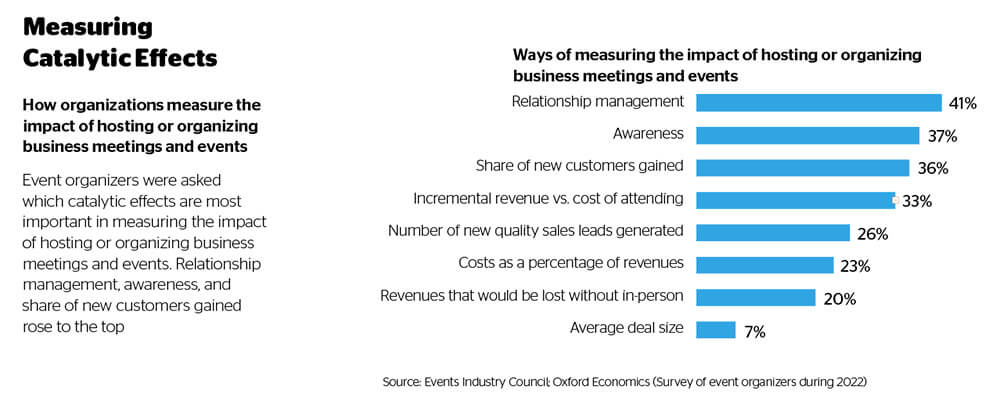
Six billion people participated in business events across more than 180 countries in 2019 before the pandemic.
In May, the Events Industry Council (EIC) released findings from its 2023 Global Economic Significance of Business Events study, which measures the full scope and economic significance of the $1.6-trillion USD global business events industry.
Working with Oxford Economics, the study analyzed the economic significance of business events during 2019 to establish the full scope of the sector before the COVID-19 pandemic. Among the findings:
- 6 billion people participated in business events across more than 180 countries.
- Business events supported a total global economic impact (accounting for indirect and induced impacts) of $2.8 trillion in business sales; 27.5 million jobs; and $1.6 trillion of GDP (representing contribution to global gross domestic product).
The three-year cumulative loss of global direct business event spending (2020-2022) totals $1.9 trillion and represents the loss of more than 16 million jobs. While direct spending in 2022 was more than 80 percent relative to 2019, global business event spending is forecast to fully recover in 2024.
- Claim or renew your subscription to Convene.
- Want deep-dive insights on events delivered to your inbox? Sign up for our newsletters.
For the first time, the study addressed the critical role business events serve in knowledge sharing, innovation, and employee engagement — critical impacts beyond direct event spending, called “catalytic effects” — via a survey conducted between May and September 2022 of 1,648 event organizers representing all global regions. Among those findings:
- 41 percent agreed that events will become increasingly important in building culture and engagement.
- 36 percent said events will be used more to advance growth of individual employees.
- Two out of five said events will be using more hybrid formats in the future.
- Nearly seven out of 10 view building relationships through face-to-face interaction as the most difficult aspect of events to replace online.

Convene spoke with EIC CEO Amy Calvert and asked her to provide additional insights on the study.
What were some of the drivers to make this Economic Significance of Business Events study different from previous versions?
We decided to assess 2019 as a high watermark prior to the pandemic. We knew we wanted to start there, but we wanted to also integrate two new components. One was looking at what we call the catalytic impact of events — trying to get our minds around what are some of those key impacts of events that are harder to quantify? We haven’t as an industry really honed in on consistent metrics there. They’re harder to measure because they need to be measured over time. But we knew that was a priority for us because I think even outside of the pandemic, those of us that have been in a position to have to advocate for investment, or really capture the hearts and minds of influencers — it’s trying to get at those deeper impacts that have more to do with the human elements that are really the pieces that people respond to. It helps articulate [what business events] mean to society as a whole.

Amy Calvert
And then, the other piece was, just from a broader perspective, we wanted to better understand recovery and key recovery metrics. So, in addition to just assessing 2019, we looked at a few different data points, looking at the recovery trajectory through demand and through hotel occupancy. We’ve been issuing on a quarterly basis a barometer tool that has been a great new resource.
What are some ways you hope this new study will have an impact?
We want to inspire new people to come into our industry and think about it a little bit differently — more around the purpose and the impact rather than thinking of it as just a job, that they feel that they’re doing something that is meaningful and directly correlates to education and supports the way people are thinking and feeling about building their careers and being lifelong learners.
When you look at the number of participants [who attend business events globally] — 1.6 billion participants annually — it’s easy to see how the business events industry really could be a true catalyst for change, really create a movement.
We talk a lot about that at EIC. What are we doing here to facilitate the growth and the support and the needs of the workforce? And it’s really to inspire people to get on the journey to be a catalyst for change, whether that’s in the area of equity and inclusion, accessibility, neurodiversity, regenerative event practice, whatever it is, how do we [capture] how we’re moving the needle there — the data points of how we’re really doing that? We have to have some more conversations about that. It’s not just storytelling about these experiences, it’s really then aligning it back to specific areas in which we want to measure our ability to drive change.
What does it mean when we say we have 27 million people who work in our industry and we say we lost so many jobs — what is the need there? We know for certain that we’ve got to figure out a different way to talk to people about why this is a great industry to work in. And it’s not just because you get to travel. It’s more of a purpose-driven conversation around how we are changing people’s lives, how we are bringing people together for the greater good. We’re fostering human connections.
These are all the things I think the next generation of people coming into our industry are going to care about. And then think about, okay, now that we know we’re trying to bring new people in our industry, how are we equipping them? How are we preparing them for their various roles?
And then we want to go back and say, how are we doing? How are the people feeling about being in this industry, and what are the things that are surprising and delighting them about their experiences and how they’re learning and growing?
Michelle Russell is editor in chief of Convene.
